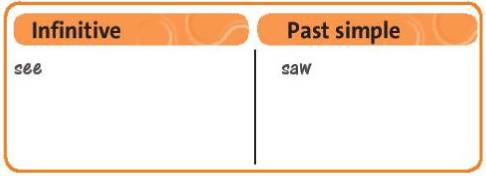Do the Emotions test. Then check your answers with the key. How many did you get right?

Những câu hỏi liên quan
Work in pairs. Compare your answers. Then check your answers with the key on page 101. How many points did each of you get?
Students practice the activity.
Đúng 0
Bình luận (0)
I. Match the questions with the answers.1. What is your hometown, Michele? 2. How big is the town? 3. What is the town’s population? 4. Did you like your hometown? 5. What did you usually do for fun? 6. How often did you go to the city? 7. When did you move to the city? 8. Do you prefer city or country life? a. I usually played outside with my friends. Sometimes we went into the city to go shopping or see a movie.b. Actually I find it exciting to live in the city, but it’s so crowded and the peo...
Đọc tiếp
I. Match the questions with the answers.
1. What is your hometown, Michele?
2. How big is the town?
3. What is the town’s population?
4. Did you like your hometown?
5. What did you usually do for fun?
6. How often did you go to the city?
7. When did you move to the city?
8. Do you prefer city or country life?
a. I usually played outside with my friends. Sometimes we went into the city to go shopping or see a movie.
b. Actually I find it exciting to live in the city, but it’s so crowded and the people aren’t friendly.
c. It’s pretty small, just about 1.86 sq mi.
d. Ten years ago.
e. I lived in a small town called Beaverton.
f. About three thousand people I think.
g. When I was little I liked it, but when I got older I found it pretty boring being in such a small town.
h. Twice or three times a month.
USE IT! Work in pairs. Complete the questions with phrases from this page and your own ideas. Then ask and answer the questions. Use the key phrases in your answers.
1. What’s the best age to __________?
2. Do you think that you’ll _________ one day? Why (not)?
3. What do you want to do when ____________?
4. When do you think you’ll _________?
1. What’s the best age to get a boyfriend?
Maybe I’ll get a boyfriend when I am about 18 – 20 years old.
2. Do you think that you’ll get rich one day? Why (not)?
Yes, of courses. Hopefully, I’ll get rich one day. Because I am working so hard every day and I believe in a bright future.
3. What do you want to do when you get old?
When I get old, I want to travel around the country.
4. When do you think you’ll get married?
I might get married when I am about 28 years old.
Đúng 0
Bình luận (0)
Do the quiz. Compare your answers with a partners. Then listen and check. 1) 0 - 5 yearsWhich of these things can children normally do before they’re five?a. Get a new hobbyb. Read and write a 20-word storyc. Get a bank account2) 6 - 12 yearsSurveys show we are happiest around nine to ten years old. Why?a. It’s when we get richb. It’s when we get a pensionc. It’s when we have the most fun and fewest worries.3) 13 - 19 yearsMost teenagers have got social media account nowadays. How old do you us...
Đọc tiếp
Do the quiz. Compare your answers with a partner's. Then listen and check.
1) 0 - 5 years
Which of these things can children normally do before they’re five?
a. Get a new hobby
b. Read and write a 20-word story
c. Get a bank account
2) 6 - 12 years
Surveys show we are happiest around nine to ten years old. Why?
a. It’s when we get rich
b. It’s when we get a pension
c. It’s when we have the most fun and fewest worries.
3) 13 - 19 years
Most teenagers have got social media account nowadays. How old do you usually need to be to get a social media account?
a. Thirteen
b. Fourteen
c. Fifteen
4) 20 - 29 years
When they have got a degree or finished their studies, people in their twenties often get a job. Which of these things can’t you do in the UK until you’re twenty-one?
a. Get a driving licence
b. Adopt a child
c. Get a boyfriend or girlfriend.
5) 30 - 49 years
At this age, many people are married. According to scientists, if you get married, you’ll probably __________.
a. be happy
b. die younger
c. live longer
6) 50 - 59 years
People often become grandparents at this age. What is the record number of grandchildren to one grandparent in the world?
a. 99
b. 140
c. 247
7) 60 - 79 years
When people get a pension, they often lead a quiet life, but not always! In the Senior Olympics event in the USA, for example, older people compete in every Olympic sport. What’s the world record for the women’s 100 metres for women over seventy?
a. 10.6 seconds
b. 14.6 seconds
c. 20.6 seconds
8) 70 - 100 years
People are getting older. In 1900, the average life expectancy in Europe was forty-three. What is it now?
a. About seventy
b. About eighty
c. About ninety
Nonfiction Reading Test Koko Directions: Read the following passage and answer the questions that follow. Refer to the text to check your answers when appropriate. Did you know that humans arent the only species that use language? Bees communicate by dancing. Whales talk to each other by singing. And some apes talk to humans by using American Sign Language. Meet Koko: a female gorilla born at the San Francisco Zoo on July 4th, 1971. Koko learned sign language from her trainer, Dr. Penny ...
Đọc tiếp
Nonfiction Reading Test
Koko
Directions: Read the following passage and answer the questions that follow. Refer to the text to check your answers when appropriate.
Did you know that humans aren't the only species that use language? Bees communicate by dancing. Whales talk to each other by singing. And some apes talk to humans by using American Sign Language.
Meet Koko: a female gorilla born at the San Francisco Zoo on July 4th, 1971. Koko learned sign language from her trainer, Dr. Penny Patterson. Patterson began teaching sign language to Koko in 1972, when Koko was one year old. Koko must have been a good student, because two years later she moved onto the Stanford University campus with Dr. Patterson. Koko continued to learn on the campus until 1976. That's when she began living full-time with Patterson's group, the Gorilla Foundation. Patterson and Koko's relationship has blossomed ever since.
Dr. Patterson says that Koko has mastered sign language. She says that Koko knows over 1,000 words, and that Koko makes up new words. For example, Koko didn't know the sign for ring, so
she signed the words finger and bracelet. Dr. Patterson thinks that this shows meaningful and constructive use of language.
Not everyone agrees with Dr. Patterson. Some argue that apes like Koko do not understand the meaning of what they are doing. Skeptics say that these apes are just performing complex tricks. For example, if Koko points to an apple and signs red or apple, Dr. Patterson will give her an apple. They argue that Koko does not really know what the sign apple means. She only knows that that if she makes the right motion, one which Dr. Patterson has shown her, then she gets an apple. The debate is unresolved, but one thing is for certain: Koko is an extraordinary ape.
Sign language isn't the only unusual thing about Koko. She's also been a pet-owner. In 1983, at the age of 12, researchers said that Koko asked for a cat for Christmas. They gave Koko a stuffed cat. Koko was not happy. She did not play with it, and she continued to sign sad. So for her birthday in 1984, they let her pick a cat out of an abandoned liter. Koko picked a gray cat and named him "All Ball." Dr. Patterson said that Koko loved and nurtured All Ball as though he were a baby gorilla. Sadly, All Ball got out of Koko's cage and was hit by a car. Patterson reported that Koko signed "Bad, sad, bad" and "Frown, cry, frown, sad" when she broke the news to her.
It seems like Patterson and Koko have a good relationship, but not everyone agrees with it. Some critics believe that Patterson is humanizing the ape. They believe that apes should be left in the most natural state possible. Even Dr. Patterson struggles with these feelings. When asked if her findings could be duplicated by another group of scientists, she said, "We don't think that it would be ethical to do again." She went on to argue that animals should not be kept in such unnatural circumstances. Nonetheless, Koko lives in her foundation today.
As for the future, Dr. Patterson and the Gorilla Foundation would love to get Koko to an ape preserve in Maui, but they are having trouble securing the land. So unless you have a few million dollars to spare, Koko's going to be spending her time in Woodland, California with Dr. Patterson. Koko probably doesn't mind that. If she moved to Hawaii, she'd have to give up her Facebook page and Twitter feed, and she's got like 50 thousand "likes." Some may deny that she knows sign language, but nobody says that she doesn't know social networking.
1. Which best expresses the main idea of this article?
a. Bees, whales, and apes like Koko all use language to communicate. b. Koko uses sign language but some think it's just a trick.
c. It is natural for gorillas and house cats to live together.
d. If you want a lot of "likes" on Facebook, get a talking gorilla.
2. Which best describes how the second paragraph is organized?
a. Chronological order b. Cause and effect c. Compare and contrast d. Problem and solution
3. Which best expresses the author's purpose in writing the second paragraph? a. The author is describing the environment in which Koko lives.
b. The author is informing readers how Dr. Patterson developed her skills. c. The author is persuading readers that Koko should be freed.
d. The author is telling readers about Koko and Dr. Patterson's background.
4. Which happened last?
a. Koko got a stuffed cat for Christmas.
b. Koko lost All Ball.
c. Koko began living with the Gorilla Foundation.
d. Dr. Patterson began teaching Koko to sign.
5. Which statement would the author most likely agree with?
a. Koko has mastered sign language without a doubt.
b. Everybody likes how Dr. Patterson has raised Koko.
c. Koko doesn't really know sign language.
d. Some people are troubled by how Koko was raised.
6. Which best defines the word duplicated as it is used in the sixth paragraph? a. To dispute a fact or disagree with someone b. To lie to someone or to fool them c. To copy or recreate something d. To be disproven through debate
7. Which event happened first?
a. Koko moved onto the Stanford University campus.
b. Koko picked All Ball out for her birthday.
c. Koko began living with the Gorilla Foundation.
d. Koko got a stuffed cat for Christmas.
8. Which best describes the main idea of the sixth paragraph?
a. Dr. Patterson has treated Koko very cruelly.
b. Dr. Patterson and Koko have a beautiful, pure, and unconflicted relationship. c. Some people think that Koko should not have been treated like a human. d. Some people are working very hard to prove that Dr. Patterson is wrong.
9. Which statement would the author most likely disagree with?
a. Dr. Patterson has worked hard to teach Koko sign language.
b. Some people think that Koko only signs to get food.
c. The Gorilla Foundation would like to move Koko to an ape preserve.
d. Dr. Patterson has no regrets about working with Koko.
10. If a book were being written about Koko and All Ball, which title would best summarize their story? a. Long Wanted, Short Lived: A Tale of Strong Loves Lost
b. Happy Ending: The Gorilla Who Got What She Wanted
c. A Tale of Two Kitties: A Stuffed Cat Versus a Real One
d. Plushy Love: How A Gorilla Fell in Love with a Stuffed Cat
Long-Response Questions
1. Does Koko really understand sign language? Support your position with quotes from the text. Explain your quotes clearly. Argue your point thoroughly.
2. What lesson can readers learn from this text? Use evidence from the text to support your position. Explain what your evidence shows.
3. Make an inference. Describe how Dr. Patterson feels about her relationship with Koko. Use evidence from the text to support your response. Explain your evidence clearly.
what is your name?
how are you ?
what did you do at the party?
how many lessons do you have today ?
how do you learn Enhlish ?
what are you reading ?
what did you see at the zoo ?
what is your addrees ?
where did you go on holiday ?
how did you get there ?
what will you do at Ha Long Bay ?
1.My name is Phuong
2.I'm fine thanks you
3.I ate foods: candy,cakes,food and fruits
4.I have fours:English,Vietnamese,Maths and IT
5.l'm read English
6.I'm reading The Fox and the crow
7.I saw monkeys
8.I live in Dien Bien
9.I went to the Phu Quoc islands
10.I went by plane
11.I swim in the sea
IX. Write the second sentence so that it has the same meaning as the first one.1. When did you buy your motorbike?→ How long_____________________________________________________________2. If I were you, I would check my answers before handing in the test.→ You had______________________________________________________________3. Everyone must respect the traffic laws.→ The traffic_____________________________________________________________4. I didn’t switch the computer off whe...
Đọc tiếp
IX. Write the second sentence so that it has the same meaning as the first one.
1. When did you buy your motorbike?
→ How long_____________________________________________________________
2. If I were you, I would check my answers before handing in the test.
→ You had______________________________________________________________
3. Everyone must respect the traffic laws.
→ The traffic_____________________________________________________________
4. I didn’t switch the computer off when I went out.
→ I forgot_______________________________________________________________
5. Living in a village always seems strange to me.
→ I have never___________________________________________________________
6. Sue had left the office before the manager arrived there.
→ When the manager______________________________________________________
7. The town council has created a cooking club.
→ A cooking_____________________________________________________________
8. Unless you leave home now, you will miss the flight.
→ If____________________________________________________________________
9. “Did you write a note for Anna?” I asked my mother.
→ I asked________________________________________________________________
10. It’s not possible to play tennis because of the rain.
→ The rain makes_________________________________________________________
IX. Write the second sentence so that it has the same meaning as the first one.
1. When did you buy your motorbike?
→ How long have you bought your motorbike?
2. If I were you, I would check my answers before handing in the test.
→ You had better check your answers before handing in the tes.
3. Everyone must respect the traffic laws.
→ The traffic laws must be respected by everyone.
4. I didn’t switch the computer off when I went out.
→ I forgot to switch the computer off when I went out.
5. Living in a village always seems strange to me.
→ I have never lived in a village before.
6. Sue had left the office before the manager arrived there.
→ When the manager arrived there, Sue had left.
7. The town council has created a cooking club.
→ A cooking club has been created by the town council.
8. Unless you leave home now, you will miss the flight.
→ If you don't leave home now, you will miss the flight.
9. “Did you write a note for Anna?” I asked my mother.
→ I asked my mother if she had written a note for Anna.
10. It’s not possible to play tennis because of the rain.
→ The rain makes it possible to play tennis.
Đúng 1
Bình luận (0)
IX. Write the second sentence so that it has the same meaning as the first one.
1. When did you buy your motorbike?
→ How long have you bought your motorbike?
2. If I were you, I would check my answers before handing in the test.
→ You had better check your answers handing in the test.
3. Everyone must respect the traffic laws.
→ The traffic laws must be respected.
4. I didn’t switch the computer off when I went out.
→ I forgot to turn off the computer when I went out.
5. Living in a village always seems strange to me.
→ I have never lived in a village.
6. Sue had left the office before the manager arrived there.
→ When the manager got there, Sue had already left the office.
7. The town council has created a cooking club.
→ A cooking established by the Town Council.
8. Unless you leave home now, you will miss the flight.
→ If you leave home now, you won't miss your flight.
9. “Did you write a note for Anna?” I asked my mother.
→ I asked my mother to write a note for Anna.
10. It’s not possible to play tennis because of the rain.
→ The rain makes it impossible to play tennis.
Đúng 0
Bình luận (0)
SPEAKING Work in pairs or small groups. Do the body quiz on page 37. Check your answers with your teacher.HOW MUCH DO YOU KNOW ABOUT THE HUMAN BODY?1. What is the most common blood type?a. AB-b. B-c. O+2. How much do fingernails grow per month?a. 0.75 mmb. 1.5 mmc. 3 mm3. Where exactly is your heart?a. On the left of your chestb. In the middle of your chestc. In the middle of your chest, a bit to the left4. How long are the human intestines?a. 3.5 mb. 8.5 mc. 13.5 m5. How many hairs are there on...
Đọc tiếp
SPEAKING Work in pairs or small groups. Do the body quiz on page 37. Check your answers with your teacher.
HOW MUCH DO YOU KNOW ABOUT THE HUMAN BODY?
1. What is the most common blood type?
a. AB-
b. B-
c. O+
2. How much do fingernails grow per month?
a. 0.75 mm
b. 1.5 mm
c. 3 mm
3. Where exactly is your heart?
a. On the left of your chest
b. In the middle of your chest
c. In the middle of your chest, a bit to the left
4. How long are the human intestines?
a. 3.5 m
b. 8.5 m
c. 13.5 m
5. How many hairs are there on the human scalp?
a. 90,000-150,000
b. 150,000-190,000
c. 190,000-250,000
6. What is the human body's biggest organ?
a. Liver
b. Brain
c. Skin
7. What is the average thickness of human skin?
a. 1-2 mm
b. 2-3 mm
c. 3-4 mm
Complete the table with the infinitive and past simple forms of the verbs in blue in the quiz. Then listen and check. How GOOD is your MEMORY?1. What was the last film that you saw?2. When was the last time that you ate in a restaurant?3. When did you last go to a circus or a zoo?4. Where and when did you first ride a bike?5. Who taught you English at primary school?6. How old were your parents on their last birthdays?7. What was the last music that you heard?8. When did you last make something...
Đọc tiếp
Complete the table with the infinitive and past simple forms of the verbs in blue in the quiz. Then listen and check.

How GOOD is your MEMORY?
1. What was the last film that you saw?
2. When was the last time that you ate in a restaurant?
3. When did you last go to a circus or a zoo?
4. Where and when did you first ride a bike?
5. Who taught you English at primary school?
6. How old were your parents on their last birthdays?
7. What was the last music that you heard?
8. When did you last make something to eat?
9. What mark did you get in your last English exam?
10. At what age did you first have a mobile phone?
11. What did you do on your last birthday?
12. Who spoke to you first at school today?
13. Who did you speak to last before you left home this morning?
14. How many people gave you presents last year? What were they?
15. How many people did you buy presents for last year? What were they?
Infinitive | Past simple |
see; eat; go; ride; teach; are; hear; make; get; have; do; speak; leave; give; buy | saw; ate; went; rode; taught; were; heard; made; got; had; done; spoke; left; gave; bought |
Đúng 1
Bình luận (0)
what your address?
what your hometown like?
who do you live with?
do you like living there?why?why not?
what do you do in the morning?
do you go to bed early in the evening?
how often do you do morning exercise?
where did you go last holiday?
how did you get there?
did you enjoy the trip
It's Thanh Hai village.
It's very large and pretty.
I live with my family.
Yes I do because it's very pretty and people are friendly.
I usually get up early.
Yes,I do.
I do this every morning.
I went to Ha Long Bay.
I went there by car.
Yes,I did.






















